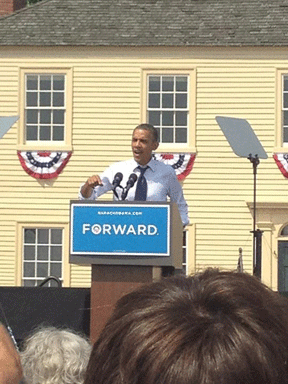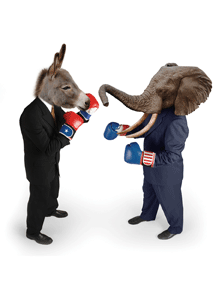By Austin Alexander
Not even the sultry, late-summer humidity could stifle the politically charged atmosphere in New Hampshire where President Obama and Republican challenger Mitt Romney kicked off their campaigns in earnest this September. Fresh from their respective conventions, the two major candidates delivered stump speeches to swarms of supporters in this key battleground state.
Yet voters can only hope that the incumbent and the contender had their shirt sleeves rolled up for reasons other than the heat: After a summer marked by infrequent volleys of personal potshots and underhanded attacks, the electorate starves for substance. In the days ahead both Obama and Romney must be willing to set aside their swashbuckling speaking strategies in order to get down to the nitty-gritty issues. And for their part, of course, voters must ask the tough questions.
Obama held his rally at Portsmouth’s Strawberry Banke, the seaport city’s historic town green framed by quaint, colonial homes. Artfully dabbing his brow with a handkerchief against a backdrop of red, white and blue bunting, the reigning Democrat praised the middle class and reaffirmed his commitment to creating jobs and safeguarding the nation’s future through investment in research and education. The President likewise dismissed Romney’s plan to reduce the budget deficit through tax cuts, quipping that his plan lacks one basic component: math. “We have been there. We’ve tried that,” Obama began. “It didn’t work then; it’s not going to work now.”
Yet any attendees of this event who were somehow able to tune into the speech Romney delivered at the same time in Orange City, Iowa, shortly before leaving for New Hampshire’s second-largest city of Nashua, would have surely been struck with a feeling of déjà vu. As the Boston Globe quotes the former Governor of Massachusetts as telling his own heaving crowd of supporters, “”This president tried, but he didn’t understand what it takes to make our economy work. I do.’’
To be sure, this is one of the most important presidential elections of our lifetime. In Portsmouth, Obama had sobered the jubilant crowd by reminding them that the electorate confronts “a choice between two different paths for America – two fundamentally different visions for how we move forward.” Nevertheless, each candidate’s afternoon speech on the inaugural day of serious campaigning did little to elucidate the clear-cut contrasts between their respective platforms; rather the sweeping rhetorical gestures and jabs each man let loose concerning the economy, the Middle East, and other issues ultimately sounded the same.
In an election cycle in which vague rhetoric and lofty appeals trump policies and platforms, voters face not a fork in the road but an amorphous mass of words and ideas put forth by two ostensibly different camps. In that vein, it is more important than ever that conscientious citizens not get swept up in the sensationalized squabbles, but instead research the issues and cultivate perspectives for themselves.
Phi Beta Kappa has long stressed the importance of deliberation and ethical reflection, which can be acquired through a liberal education and are indispensable to active citizenship. Such skills enable a voter to examine every side of an issue – including their own – before making an informed and careful decision. As Phi Beta Kappa members understand, paying attention only to the swagger of charismatic candidates and the filtered, heavily-biased reporting of major news outlets does little to equip the electorate for participation in the political process. Individuals must cut through the white noise in order to get at the issues at hand.
This method of scrutiny is doubly important because it encourages empathy and cooperation between rival sides on divisive political issues. The stagnation of activity on Capitol Hill in the past year and the screaming matches of the summer serve as bitter reminders that a true democracy only works if its citizens are able to compromise in the interest of the greater good. In light of the ongoing culture wars, it is easy to forget that more things unite Americans than divide them. It is important for Phi Beta Kappa members, and all Americans, to step outside the whirr of bickering, take a deep breath and examine the issues for themselves.

Austin Alexander is a senior at Clark University majoring in history. Clark University is home to the Lambda of Massachusetts chapter of Phi Beta Kappa.
Photo above: Obama in Portsmouth, New Hampshire. Photo by Zach Eaton.




